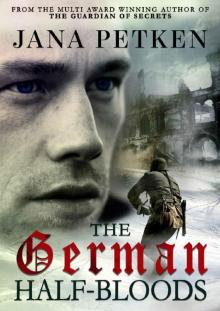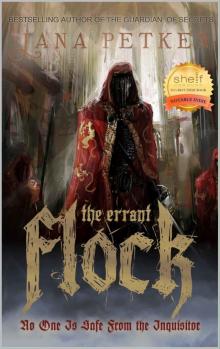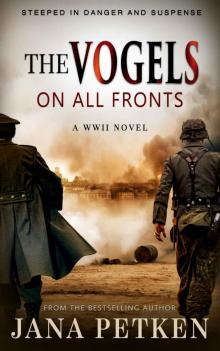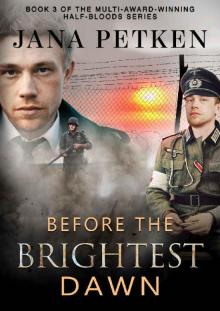- Home
- Jana Petken
Before The Brightest Dawn (The Half-Bloods Trilogy Book 3)
Before The Brightest Dawn (The Half-Bloods Trilogy Book 3) Read online
Before The
Brightest Dawn
The Half-Bloods
Trilogy
Book 3
Jana Petken
©2019 by Jana Petken. All rights reserved.
No part of this book may be reproduced, stored in a retrieved system, or transmitted by any means without the written permission of the author.
Before The Brightest Dawn is a work of fiction and bears no factual resemblance to the fictional characters or what happens to them in the story.
Cover design by Adriana Hanganu
Synopsis: Before The brightest Dawn
Jana Petken’s extraordinary historical epic, The German Half-Bloods Trilogy, reaches its sweeping, heart-wrenching conclusion.
In The German Half-Bloods and The Vogels, Jana Petken followed the turbulent lives of an Anglo-German family as they forged their paths through the Second World War. Now, the conflict intensifies in the Soviet States, the boiling Western Desert of North Africa, and the growing resistance movement in Poland.
Will Max, Paul, and Wilmot Vogel survive the most ruthless phase of the war to date?
Max takes a path to momentous events in North Africa where he balances undercover games of espionage in decadent Cairo with dangerous missions behind the German Afrika Korps’ lines.
Paul’s loyalty to the Third Reich continues to wane as Germany’s extermination programmes in Poland expand, and he is stalked by the new Kriminalinspektor, Manfred Krüger. Can he stay one step ahead of a man who has been ordered to destroy him?
Wilmot faces new challenges in the Afrika Korps, but is he mentally and physically prepared to lead his men into Libya’s fiery desert and against the British 8th Army?
Before The Brightest Dawn, the long-awaited Book 3 of the Half-Bloods Trilogy, concludes the story of the inextricably entangled fates of three brothers … through a war that becomes increasingly brutal and cruel.
Other titles available from Jana Petken:
Multi Award Winning #1Bestseller, The Guardian of Secrets
Screenplay, The Guardian of Secrets
#1 Bestselling Series: The Mercy Carver Series:
Award-Winning Bestseller Dark Shadows
Award-Winning Bestseller Blood Moon
Multi-Award-Winning #1Bestseller, The Errant Flock
Award-Winning Bestseller, The Scattered Flock
Award Winning, Flock, The Gathering of The Damned
Multi-Award-Winning #1Bestseller, Swearing Allegiance
Multi Award Winning, #1 Bestseller, The German Half-Bloods
#1Bestseller The Vogels: On All Fronts
Before The Brightest Dawn
Coming early 2020, the sequel to Swearing Allegiance
Audio Books
The Guardian of Secrets, in association with Tantor Media
Swearing Allegiance, The Mercy Carver Series, The Flock Trilogy.
The German Half-Bloods.
in association with Cherry-Hill Audio Publishing
In production: The Vogels: On all Fronts and Before The Brightest Dawn
Acknowledgements
Many thanks to my dear readers.
Thanks to my editor, Patricia Rose
Proofreading and wonderful historical fact checker, Caro Powney
Adriana Hanganu, Graphics and cover design
Author’s Note
This book is written in UK English and all spellings, punctuations, and grammar adhere to UK English, World English, and the Oxford English Dictionary
Hope you enjoy, Before The Brightest Dawn!
Part One
“If such a thing as sympathy existed in war, no one would die, and soldiers would shake hands with the enemy and march homewards without a drop of blood being spilt. Empathy, thoughtfulness, even conscience are luxuries we can ill afford. There is only duty – that is everything.”
Manfred Krüger, Kriminalinspektor Gestapo.
Łódź, Poland, 1942
Chapter One
Max Vogel
Cairo, Egypt
29 June 1942
Max sauntered through the streets of Cairo’s commercial centre, situated between Miden Ismail Pasha and Ezbekieh Gardens. Everyone ambled at a slow, easy pace; Cairo was as hot as hell, sucking the life and energy out of the people living there during summertime. This district was a cauldron. Broad streets were lined with office buildings, apartment blocks, the odd department store, banks, cinemas, cafés, and nightclubs. The taller buildings blocked the hot and uncomfortable afternoon breezes from flowing freely while affording welcome shade; he didn’t know what was worse, a stinging breeze or no air.
He marvelled at the architectural styles of the structures: Viennese, Italian, Art Nouveau, and flamboyant Neo-Arabic with intricate engravings. Cairo had many faces, Max had discovered on his orientational trips around the vast city, and he knew most of them.
For British troops in the desert, the capital meant fleshpots and military brass hats, a boiling version of square-bashing, field exercises, and nightly battles with bedbugs. It held the promise of barrels of cold beer, exotic Egyptian women with piercings in bare bellies that rippled like gentle waves when in dance, and European escorts, more than willing to open their legs for a price to tired, lonely soldiers.
For well-connected officers, the city signified polo matches or rounds of golf at the Gezira Club, cocktails on the Shepheard Hotel’s terrace, and swanky dinners requiring black-tie formalwear at the Turf Club; an establishment favoured by the Egyptian royals. This Cairene scene suited many British business and military men, who lived a life far beyond what their wallets could have afforded back in Britain. It was easy-going, trivial, elegant, and hedonistic.
When Max arrived at The Shepheard Hotel, a Cairo landmark some said was second only to the great pyramids, he headed towards the Moorish Hall. It lay beyond the terrace where wicker chairs and tables commanded a lofty, yet shaded, view of the city. As he weaved his way through the crowded area, he overheard two British men lamenting that they’d pinned all their hopes and money on a country that was now in danger of being overrun by Rommel’s Afrika Korps or an enormous influx of British soldiers who would undoubtedly tarnish Cairo’s sophisticated, well-mannered character.
“I don’t know which would be worse … seeing a Nazi general sitting here drinking a schnapps or watching a troop of His Majesty’s soldiers vomiting beer on Cairo’s streets,” one of the men complained.
The other whined, “Let’s face it, Cairo’s not been the same since those lower-class refugees from the Balkans descended on us. I fear life as we know it has gone forever, old chap.”
Max moved on, leaving the mishmash of resentful, bitter voices on the terrace and entering the Moorish Hall. People flocked there during the hottest time of the day to hide from the brilliance and heat of the midday sun. It was deliciously cool and dimly lit by the coloured-glass dome ceiling that sat high above small diagonal tables and stumpy-legged stools being occupied by men with sour, worried frowns.
With his eyes becoming accustomed to the dimness, Max searched the faces of men in the dining room area sitting in small groups on padded, dining-room chairs positioned around small circular and rectangular linen-covered tables. The place gave an air of intimacy, and more importantly, discretion, which was precisely why it had been chosen for the forthcoming meeting.
Finally, Max spotted British Intelligence officer, Captain Theobald Kelsey, and his Egyptian MI6 counterpart, Gaidar Shalhoub. Both men stood at the entrance, as Max had done, their eyes sweeping the room and blinking away any residual flashes of sunlight on their retinas.
Max raised his hand in a subtle wave while guarding the only available table, which, as luck would have it, was in a corner position and had only four chairs around it.
The three men shook hands in a businesslike fashion. “It’s a hot one today,” Theobald Kelsey, known as Theo, said.
“It’s hot every day,” Gaidar Shalhoub scoffed. “You English make me smile. You complain about the heat you expertly avoid, whilst we Arabs toil in the fields without complaint or respite. You should both try it one day.” Gaidar took a seat. He was exceptionally tall and spare for an Arab; as tall as Max’s height of six-foot-three. Coal-black hair framed an unusual face; instead of the typical hooked Arab nose, his was straight, short, and tilted upwards at its tip. He was endowed, however, with large, almost black almond-shaped eyes, framed with eyelashes that any woman would envy. And to top off that feminine feature, he also had full pouting lips above a hairless chin. His mother, he’d informed Max, was Egyptian, his father an English diplomat who had died years earlier. He held both Egyptian and British passports.
Max took his seat. “I’m glad you could keep our appointment,” he said, his voice laced with a heavy German accent. “Everyone is in a bit of a flap today.”
“Yes, we’re all a bit nervy, what with Rommel being so close to Alexandria. The world is going to hell, but we still need to know the time, eh?” Theo smiled.
Max gestured to his briefcase. “Ja … I have plenty of watches with me. Let’s order drinks before we get down to business. You’re looking decidedly sunburnt and freckled, Captain Kelsey.”
“Cairo will do that to a peely-wally Englishman, Herr Fischer.”
Max rested his briefcase against the leg of the table. Full of genuine Swiss timepieces, pricelists, and an array of interchangeable straps, it had become increasingly heavy on his walk. He gestured to a waiter and slipped into his Swiss-watch salesman’s cover.
“Whisky? Theo?”
“Sounds good. Water on the side for me,” Theo replied.
“Tea for me,” Gaidar said, directing his request to the arriving waiter.
After ordering, Max sat back in his chair and sighed with relief as his hot skin cooled. “I love this place,” he said.
“It has been around forever, or so it seems. The British are proud of it. In the last century, it was home base for travellers on some of the earliest expeditions organised by Thomas Cook,” Gaidar explained. “My grandfather told me stories of archaeologists of great note who stayed here when taking a break or trying to garner more funds for their digs from wealthy patrons. We are in more sinister times, I’m sorry to say. Nowadays, it is the perfect haunt to do business and find out the latest news on the war and the order of battles to come. Not quite the romantic picture of old, eh?”
“How’s business?” Theo asked Max.
“Couldn’t be better.” Max lifted his case, put it on the table, and then opened it to reveal a selection of watches.
Theo casually glanced around the room. The young freckled-faced man was of medium height and build with a mop of sandy hair, worn straight from the pages of a 1920s magazine. He plastered it to his head with a deep side parting, using English Lavender Brilliantine to keep it in place. His nose was birdlike; hooked, and thin and pointy at the end. His most noticeable feature, however, was his limp. He’d been wounded the previous year in the Tobruk siege and had almost lost his foot. He wouldn’t see action again but being kept on in Cairo made him feel useful, he’d told Max at their first meeting.
Disapproving patrons ogled Max from their tables. He wasn’t popular in this city. If the British clientele had their way, they would get him kicked out of their social haunts. If it weren’t for Theo and Gaidar, both MI6 officers, keeping him out of trouble, he would probably be in a British prison with some bogus charge to his name. He had come close. The British in Egypt hated his German accent and the fact that he was from neutral Switzerland, a country that still did business with Axis countries as well as the Allies. Max had heard men grumble that the Swiss government had no morals, no shame. It would sell to the devil for profit.
Max ignored the British down-the-nose glares while laying out a display of fobs and wristwatches. “Take your time,” he grinned at Gaidar, “and excuse the pun.”
The waiter appeared with the men’s drinks. Max, giving Theo and Gaidar a moment to study each watch, sipped his whisky whilst keeping his hooded eyes on the men at the table closest to him. He felt vulnerable, naked, out in the cold. His previous missions had always been conducted in enemy territory in a foreign country, but Egypt was like an extension of Britain, with more snobbery and backbiting to deal with, and he was having a hard time adjusting to his Swiss character. This time, he was not afraid of being arrested by the Gestapo but by British authorities who might see him as a spy. He was treading a hazardous path in Egypt, and although necessary, he was uncomfortable using the exaggerated German accent.
With another swallow of his scotch, he brushed aside his concerns. His cover was solid. He had gone to great lengths to consolidate it with bad behaviour in the most public places. Twice he had instigated a brawl in a Cairo nightclub with two British army officers, and on another occasion, he’d bad-mouthed Winston Churchill, saying he blew more smoke out his arse than out of his cigar-loving mouth. No, Rolf Fischer wasn’t popular, but infamy had been his objective.
He lived and breathed Rolf. He conducted secret meetings in various public venues, deserted buildings, and in the desert itself under the stars. Cairo was a hotbed for spies – he didn’t know how many British or German agents were operating in the North Africa arena, but he surmised that MI6 and the Abwehr didn’t either. Everyone, including petted wives of important diplomats, wanted to shroud themselves in suspicion and intrigue. They craved a piece of the Cairo notoriety and mystique that their peers perpetually talked about; holding onto tantalising rumours that might give them currency and make them stand out in a crowd.
“Are you selling many watches on this trip?” Gaidar asked Max.
“Yes, I’m pleased to say I am,” Max replied. “Despite the Allies establishing a blacklist of Swiss firms who trade with Germany and Italy, I’m doing more business with the British than ever. Every officer I meet wants to wear a new wristwatch.” He smiled to cover his lie; he had sold a grand total of six watches since his arrival in the country six weeks earlier. “I am selling my products at good prices to the English, but they don’t appreciate how small my profit margin is. You fellows are not easy to barter with, especially northerners.”
“Don’t you mean the Scots?” Theo said, himself being from Manchester.
“No, the Scots are my best customers, and they always throw a whisky or two into the deal.”
The discussion turned more serious. Being in the corner afforded the three men a view of the entire room, and after sitting there for a while, they could now gauge who might be close enough to hear their conversation and monitor people who were arriving and leaving. This setup reminded Max of the lunch he’d had almost three months earlier with Judith in London. She had wanted … no, needed, to speak German to express herself, just as he needed to have a candid conversation with Theo and Gaidar Shalhoub about the case they were working on together.
“How is your friend, Anubis? Any problems with him?” Theo finally got to the grain of the meeting.
Max pondered the question of his asset. To the world at large, Anubis El-Masri was a well-to-do Egyptian translator working for the British Consulate in Alexandria. The man behind the façade, however, had been born into poverty on the banks of the River Nile at Luxor and had spent his formative years pickpocketing tourists. Innovative, and with a brilliant mind, he had made the British blacklist as a racketeer. Life could have ended badly for him, but British Intelligence had seen something in the unassuming-looking Arab. He’d been exactly what they’d been looking for: wily, a great liar, a flatterer, and an entertaining storyteller.
From nothing, Anubis had set up his racket using organised gangs
of British army deserters to rob Ordnance Corp and NAAFI stores, and he was so successful that SOE had ordered he be handed over to them when captured. Tough luck for SOE that MI6 had got to him first, offering the man a choice between life as a British spy or being taken out to the desert and shot in the head along with the deserters he’d trained.
“Let’s say if it were not for our soldiers holding his family hostage, I wouldn’t trust the man as far as I could spit. Having said that, he’s sticking to our bargain. I think he’s finally made a breakthrough. We’re getting close.”
“To a suspect?” Theo’s face lit up.
“Yes. Anubis thinks so. He’s befriended a Sudanese driver at the consular offices … a bit of a loner, originally from Cairo, with a wife and five children. He’d be uninteresting were it not for a rather revealing conversation he had with our man.”
“Oh?”
Max nodded. “This man – Abu Hanifa is his name – wanted to know if Anubis studied his Koran, and if he did, how often he devoted his time to it. He said he knew scholars who could give instruction and open Anubis’ eyes to the evil of British occupation.”
Max paused to glance around the immediate area, then leant in to take a handful of peanuts from the glass bowl on the table. “When Anubis feigned interest, Abu let slip he was a member of the Muslim Brotherhood.”
“Could he be our murderer? Our way into the Islamist group?” Gaidar asked.
“I don’t know, but this initial contact is a step in the right direction.”
“Does Anubis know everything about the operation?”
“No, not yet. He knows he’s part of a murder investigation, and there is a connection between the two murdered men and the Muslim Brotherhood. I told him that Farid, the Arab employee, was stabbed nine times in what was an angry, personally motivated attack. Anubis then asked why John Bryant, the MI6 agent, was strangled in an alleyway in Cairo when he worked in Alexandria’s consular offices. He suspects Bryant was a spy.”

 Blood Moon
Blood Moon The Guardian of Secrets and Her Deathly Pact
The Guardian of Secrets and Her Deathly Pact Dark Shadows
Dark Shadows The German Half-Bloods (The Half-Bloods Trilogy Book 1)
The German Half-Bloods (The Half-Bloods Trilogy Book 1) Swearing Allegiance (The Carmody Saga Book 1)
Swearing Allegiance (The Carmody Saga Book 1) The Errant Flock
The Errant Flock The Vogels: On All Fronts (The Half-Bloods Trilogy Book 2)
The Vogels: On All Fronts (The Half-Bloods Trilogy Book 2) The Guardian of Secrets
The Guardian of Secrets Before The Brightest Dawn (The Half-Bloods Trilogy Book 3)
Before The Brightest Dawn (The Half-Bloods Trilogy Book 3) Blood Moon (The Mercy Carver Series Book 2)
Blood Moon (The Mercy Carver Series Book 2) Dark Shadows (The Mercy Carver Series Book 1)
Dark Shadows (The Mercy Carver Series Book 1)